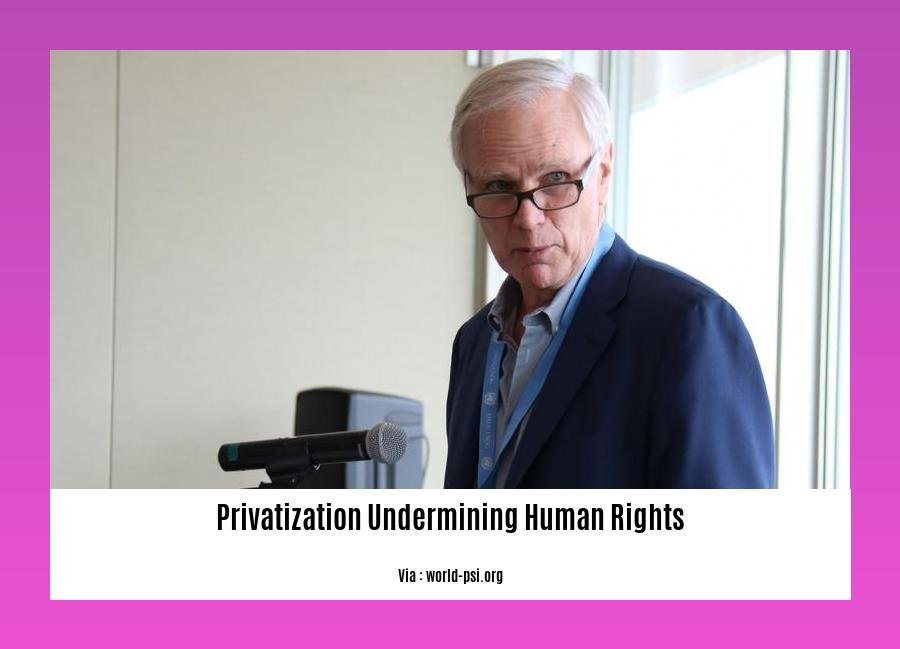[Privatization Undermining Human Rights: A Grave Threat to Social Justice] As privatization deepens its grip on essential services and sectors, it’s imperative to scrutinize its profound implications on human rights. The private sector’s increasing involvement raises concerns about the erosion of fundamental freedoms, particularly among vulnerable populations. Understanding the interplay between privatization and human rights is crucial for developing policies that safeguard human dignity and social justice.
Key Takeaways:

- Privatization can erode human rights protections, as private companies may prioritize profit over public welfare.
- It can marginalize low-income people by introducing user fees that make essential services unaffordable.
- Private entities may not be as accountable to the public as government agencies, leading to lower quality services.
Privatization Undermining Human Rights
Privatization, the handover of public services to private corporations, has sparked major concerns due to its detrimental impact on human rights.
Eroding Access to Essential Services:
When profit becomes the primary concern, private companies may compromise services vital to our well-being. Healthcare, education, and water, once considered universal rights, can become inaccessible for those unable to pay. This divide exacerbates inequality and violates our right to a dignified life.
Marginalizing the Vulnerable:
Privatization often ushers in user fees, placing an insurmountable financial burden on low-income communities. Essential services become unaffordable, pushing marginalized populations further into the shadows. This is a gross violation of their right to equality and social inclusion.
Unfulfilled Promises:
Private companies may not share the same level of accountability as public agencies. This lack of oversight can result in subpar service delivery. The pursuit of profit can trump public welfare, leaving citizens with inferior services that fail to meet their basic needs.
Protecting Human Rights in the Face of Privatization:
To safeguard our rights, we must be wary of the potential pitfalls of privatization. We must demand transparent and accountable private sector involvement, ensuring that essential services remain accessible to all. Governments must prioritize public welfare over corporate profits, upholding our fundamental rights and fostering a just and equitable society.
Concerned about the insidious erosion of human rights? Dive deeper into the alarming ways that corporate policies, business practices, and deregulation are neglecting rights, violating civil liberties, and threatening freedoms-unveiling a chilling reality that demands urgent attention.
Neoliberalism Essay: Privatization as a Threat to Human Rights
Many believe Neoliberalism Essay has the capacity to erode human rights protections, particularly those relating to economic and social well-being. What is neoliberalism exactly? It is an economic and political ideology that advocates for free markets, privatization, deregulation, and reduced government intervention. Its proponents argue that this approach fosters economic growth and prosperity. However, critics contend that neoliberalism undermines social protections and exacerbates economic inequality.
How does neoliberalism impact human rights?
Privatization, a key component of neoliberalism, involves the transfer of public services to private entities. While privatization can potentially improve efficiency and innovation, it also raises concerns about the erosion of human rights.
Privatization can lead to:
Reduced access to essential services: Private companies may prioritize profit over public welfare, leading to reduced access to essential services like healthcare and education.
Increased costs for vulnerable populations: Privatization often introduces user fees, making services unaffordable for low-income communities.
Lower quality of services: Private companies may not have the same level of accountability to the public as government agencies, resulting in lower quality services.
Examples of privatization’s impact on human rights:
Education: Privatization of education can lead to increased costs, reduced access for low-income students, and a narrowing of the curriculum.
Healthcare: Privatization of healthcare can result in higher costs, reduced access for the uninsured, and a focus on profit-driven care.
Key Takeaways:
- Neoliberalism promotes privatization and reduced government intervention.
- Privatization can erode human rights protections, particularly related to economic and social well-being.
- Privatization can lead to reduced access to essential services, increased costs for vulnerable populations, and lower quality of services.
Most Relevant URL Source:
- The Human Rights to Health and Education in the Age of Transformation
Privatisation of health care
Privatization of health care, the transfer of health services from public to private entities, has been advancing across the globe. While it’s often touted as a solution to healthcare challenges, we must critically examine its implications for human rights and social justice.
How does privatisation of health care impact human rights?
– Access to Healthcare: Privatization can create barriers to healthcare access, particularly for marginalized communities. User fees, reduced public funding, and profit-driven motives can exclude those who need care the most.
– Quality of Care: Studies indicate that privatization may not enhance healthcare quality. Private providers may prioritize profits over patient outcomes, leading to compromised care standards.
– Equity and Solidarity: Healthcare privatization undermines the principles of equity and solidarity. It creates a two-tiered system where those who can afford private care receive better treatment, while others are left behind.
Key Takeaways:
- Privatization of health care can create barriers to healthcare access, especially for marginalized populations.
- Evidence suggests that Privatization of health care may not improve healthcare quality.
- Privatization of health care can undermine the principles of equity and solidarity in healthcare systems.
Citation:
Impact Policies. (2021). Healthcare Privatization: A Roadblock on the Way to Universal Health Coverage.











